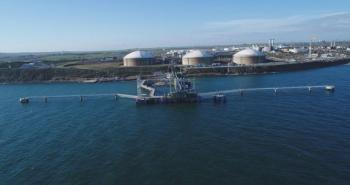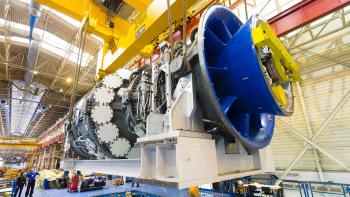
Georgia Tech Presents on Low-Carbon Fuels at POWERGEN 2024
Benjamin Emerson, Senior Research Engineer at Georgia Tech discussed the challenges with low-carbon gas turbine fuels, including methane, hydrogen, and ammonia.
On Wednesday, Jan. 24 at POWERGEN 2024, Benjamin Emerson, Senior Research Engineer at Georgia Institute of Technology, hosted Insights on Low-Carbon Fuels for Power Generation, a detailed presentation on alternative gas turbine fuels, including a topical look at technical issues, common questions, and misconceptions surrounding hydrogen and ammonia as fuels.
What low-/no-carbon options are there?
Emerson focused on gas-turbine fuels, breaking it into two categories: gaseous fuels: methane, hydrogen, and ammonia; and liquid fuels: renewable methanol, renewable diesel, and sustainable aviation fuels (SAF).
Among the gaseous fuels, he focused on flame speed, which is how fast a flame can propagate through flammable moisture.
Flame Speeds:
Methane: 30.7 centimeters per second
Hydrogen: Burns 10X faster than methane and 42X faster than ammonia
Ammonia: Burns 50X slower than hydrogen
Emerson said that surprisingly today’s fleet of older assets of diffusion combustors, or non-premixed combustors, actually have good hydrogen capabilities because they don't premix the fuel and air together (premixing can cause hydrogen flashback), but there are other issues related with these older assets. Conversely, current technologies present challenges due to the premixing of fuel and air.
Emerson defined a few terms to further clarify fuel-related challenges.
- Flashback occurs because of high flame speed and is when the flame travels upstream of the combustor.
- Autoignition is a spontaneous condition of a combustible mixture when it gets hot enough, and it tends to be an issue with higher hydrocarbons.
- Blowout occurs when the flame is blown out of the combustor. It makes the fuel less reactive and leads to performance loss.
Higher hydrogen carbons cause issues with:
- autoignition
- NOx
Hydrogen causes challenges with:
- flashback
- fast combustion
There are not many ammonia combustors, but ammonia causes challenges with:
- blowout
- NOx
A note on liquid fuels: Emerson said that much of what the industry knows about liquid fuels is being led by aviation. It leads the gas turbine market in renewable liquids, and the National Jet Fuels Combustion Program leads testing for aviation fuels. There is a difference between biodiesel and renewable diesel. Renewable diesel is a hydrocarbon. Biodiesel contains oxygen; it can’t be stored for long periods of time.
Hydrogen & Ammonia Challenges
“There is a misconception that when you burn hydrogen, you will necessarily make more NOx and that’s not actually rooted in first principles. Hot air, time, and temperature—this is where the NOx comes from,” Emerson said. He debunked and broke down that myth.
Some of the challenges with dry low NOx (DLN) systems and hydrogen are, as mentioned earlier, the protentional for flashback as hydrogen travels upstream of the combustor. Most of the OEMs that are publishing running 100% hydrogen are doing it on older assets (i.e., diffusion combustors). Whereas most OEMs using modern DLN systems are getting to about 50% by volume.
The research on ammonia is still a very active area. One challenge Emerson’s research at Georgia Tech is finding is with flame stabilization: how to simply hold the flame in the combustor. Another challenge with ammonia is it produces high NOx emissions.
“And, if we want to have any kind of fuel flex, changing the fuel supply is a challenge with ammonia as well,” Emerson said.
Interestingly, ammonia’s phase diagram looks a lot like propane’s. Also interesting is ammonia’s use as a refrigerant (it’s currently used in skyscrapers). It is about 10 times more potent a refrigerant than the typical refrigerants used. There are challenges in that regard, but Emerson said there may be some opportunities with it as a cooling agent.
Newsletter
Power your knowledge with the latest in turbine technology, engineering advances, and energy solutions—subscribe to Turbomachinery International today.




